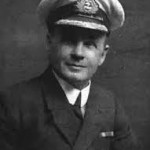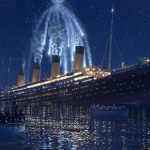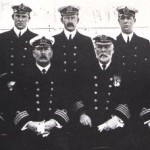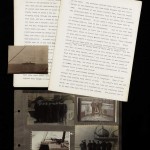 On the night of April 14th, 1912, a man by the name of Charles Herbert Lightoller was standing on the bridge of the RMS Titanic. Lightoller was on board the Titanic as er second officer, a slit demotion for him, but he was just happy to be aboard the largest ship yet launched. Though despite his status as second officer, Lightoller still loved his job, and was keeping watch on the bridge. When o’clock came, it was time to change the officers on the bridge, and Lightoller bid goodnight to his replacement, First Officer William Murdoch. Everything was calm at this time of night, the weather was clear, the sea smooth, and all Lightoller could think of was his warm bed and cozy cabin that was waiting for him below decks. Little did Lightoller know that is life would change forever in a little under two hours, and what happened next would go down in history as one of the most tragic nights ever. At 11:40, the Titanic would strike an iceberg, and Lightoller would be fighting for not only his life, but the lives of the passengers on board that were counting on him, and the other officers, to get them to safety.
On the night of April 14th, 1912, a man by the name of Charles Herbert Lightoller was standing on the bridge of the RMS Titanic. Lightoller was on board the Titanic as er second officer, a slit demotion for him, but he was just happy to be aboard the largest ship yet launched. Though despite his status as second officer, Lightoller still loved his job, and was keeping watch on the bridge. When o’clock came, it was time to change the officers on the bridge, and Lightoller bid goodnight to his replacement, First Officer William Murdoch. Everything was calm at this time of night, the weather was clear, the sea smooth, and all Lightoller could think of was his warm bed and cozy cabin that was waiting for him below decks. Little did Lightoller know that is life would change forever in a little under two hours, and what happened next would go down in history as one of the most tragic nights ever. At 11:40, the Titanic would strike an iceberg, and Lightoller would be fighting for not only his life, but the lives of the passengers on board that were counting on him, and the other officers, to get them to safety.
The Conduct of the Crew
 An important part of Lightoller’s letter was what the second officer wrote about the conduct of Titanic’s crew. Whenever a disaster strikes, people can react in an unpredictable manner because a serious situation can bring out either the best or the worst in people. The most important thing that Captain Smith insisted upon was that the passengers not panic, and he advised that the crew be on their best behavior so the passengers would remain calm. However, did the crew really behave in the best way possible? According to the typed letter from Lightoller, the answer is yes. Lightoller wrote, “It is quite clear from this account that these men were fully aware of what was about to happen to them yet showed great courage to carry on like normal to help reassure the passengers around them.” What people need to remember is the terrible situation the crew was put in, and they knew they might not make it to any of the lifeboats. The crew was willing to sacrifice their own lives to ensure those of the passengers, and that alone speaks volumes to the character of those men and women.
An important part of Lightoller’s letter was what the second officer wrote about the conduct of Titanic’s crew. Whenever a disaster strikes, people can react in an unpredictable manner because a serious situation can bring out either the best or the worst in people. The most important thing that Captain Smith insisted upon was that the passengers not panic, and he advised that the crew be on their best behavior so the passengers would remain calm. However, did the crew really behave in the best way possible? According to the typed letter from Lightoller, the answer is yes. Lightoller wrote, “It is quite clear from this account that these men were fully aware of what was about to happen to them yet showed great courage to carry on like normal to help reassure the passengers around them.” What people need to remember is the terrible situation the crew was put in, and they knew they might not make it to any of the lifeboats. The crew was willing to sacrifice their own lives to ensure those of the passengers, and that alone speaks volumes to the character of those men and women.
Brave To the Very End
 The Titanic struck the iceberg at 11:40 pm, and the ship bean to fill wit water in an instant. About 10 minutes after the collision, Thomas Andrews could already tell that the ship was listing to port, which takes thousands of gallons of water. Imagine the amount of water it must have taken for the ship the size of the Titanic to be already tilting to the left in just mere minutes after brushing against the iceberg? The amount of water pouring in so quickly had Thomas Andrews concerned, and he knew that the Titanic was doomed to sink. Andrews had to break the bad news to the captain, and to the senior officers, that there was only a short amount of time before the ship was on the bottom of the ocean. Lightoller’s letter talked about the very last time he saw some of the crew. “Each one individually came up to me and shook hands. We merely exchanged the words ‘Goodbye, old man’.” It was shortly after this exchange that Lightoller wrote about seeing these very men he had spoken to get swept overboard when a giant wave struck the ship. how hard must it have been for the Second Officer to see the men he served with basically fall to their deaths? Lightoller’s letter was about the brave crew, but honestly, he was just as brave as they were. Not only did Lightoller survive the sinking, and was the only senior officer to do so, but he continued to serve aboard ships, and even used his own yacht when World War I broke out.
The Titanic struck the iceberg at 11:40 pm, and the ship bean to fill wit water in an instant. About 10 minutes after the collision, Thomas Andrews could already tell that the ship was listing to port, which takes thousands of gallons of water. Imagine the amount of water it must have taken for the ship the size of the Titanic to be already tilting to the left in just mere minutes after brushing against the iceberg? The amount of water pouring in so quickly had Thomas Andrews concerned, and he knew that the Titanic was doomed to sink. Andrews had to break the bad news to the captain, and to the senior officers, that there was only a short amount of time before the ship was on the bottom of the ocean. Lightoller’s letter talked about the very last time he saw some of the crew. “Each one individually came up to me and shook hands. We merely exchanged the words ‘Goodbye, old man’.” It was shortly after this exchange that Lightoller wrote about seeing these very men he had spoken to get swept overboard when a giant wave struck the ship. how hard must it have been for the Second Officer to see the men he served with basically fall to their deaths? Lightoller’s letter was about the brave crew, but honestly, he was just as brave as they were. Not only did Lightoller survive the sinking, and was the only senior officer to do so, but he continued to serve aboard ships, and even used his own yacht when World War I broke out.
 A letter written by Charles Lightoller is going up for auction, and what makes it special is that the man who wrote it served as the second officer on the RMS Titanic. The Titanic went down in 1912, and is considered one of the greatest disasters at sea ever. Written on a typewriter, Lightoller recalls what the voyage was like, and then when disaster struck, he reported on the conduct of the crew right up until the end. After the Titanic disaster, Lightoller would continue to serve on ships, but never got a command of his own.
A letter written by Charles Lightoller is going up for auction, and what makes it special is that the man who wrote it served as the second officer on the RMS Titanic. The Titanic went down in 1912, and is considered one of the greatest disasters at sea ever. Written on a typewriter, Lightoller recalls what the voyage was like, and then when disaster struck, he reported on the conduct of the crew right up until the end. After the Titanic disaster, Lightoller would continue to serve on ships, but never got a command of his own.
Charles Herbert Lightoller passed away on December 8, 1952 at the age of 78. Lightoller’s body would not be buried, for he wished to be cremated, and the ashes of this Titanic officer, and war hero, would be scattered at the garden of Remembrance.

